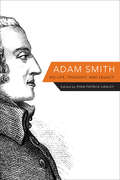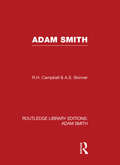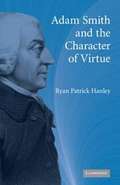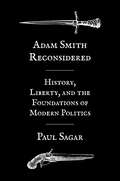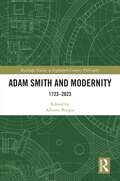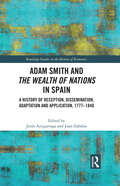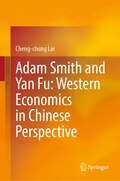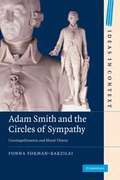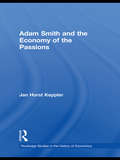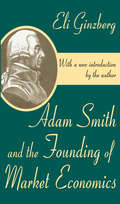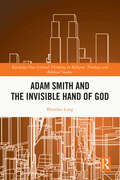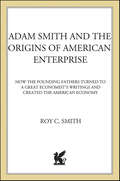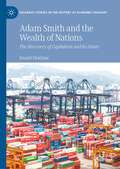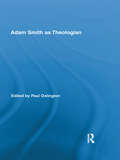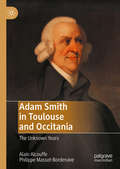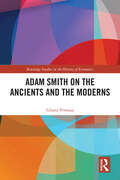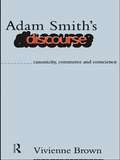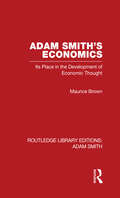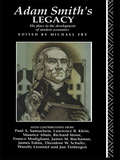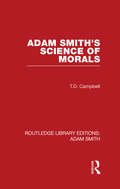- Table View
- List View
Adam Baxter Co./Local 190: 1983 Negotiation, Local 190 Confidential Information
by Victoria Medvec Kathleen L. McginnExercise
Adam Baxter Co./Local 190: 1985 Negotiation, Baxter Management Confidential Information
by Victoria Medvec Kathleen L. McGinnIncludes a series of three negotiation exercises portraying management/labor relations at ABC over a period of seven years. ABC, initially a family-owned business, had prided itself on its cooperative relationship with its union, Local 190. With the skyrocketing inflation of the 1970s, management considered drastic changes. Management and labor would undergo a series of negotiations over wages, benefits, and work conditions at ABC's main plant in Deloitte, Iowa.
Adam Baxter Co./Local 190: 1985 Negotiation, Baxter Management Confidential Information
by Victoria Medvec Kathleen L. McginnIncludes a series of three negotiation exercises portraying management/labor relations at ABC over a period of seven years. ABC, initially a family-owned business, had prided itself on its cooperative relationship with its union, Local 190. With the skyrocketing inflation of the 1970s, management considered drastic changes. Management and labor would undergo a series of negotiations over wages, benefits, and work conditions at ABC's main plant in Deloitte, Iowa.
Adam Baxter Co./Local 190: 1985 Negotiation, Local 190 Confidential Information
by Victoria Medvec Kathleen L. McGinnIncludes a series of three negotiation exercises portraying management/labor relations at ABC over a period of seven years. ABC, initially a family-owned business, had prided itself on its cooperative relationship with its union, Local 190. With the skyrocketing inflation of the 1970s, management considered drastic changes. Management and labor would undergo a series of negotiations over wages, benefits, and work conditions at ABC's main plant in Deloitte, Iowa.
Adam Baxter Co./Local 190: 1985 Negotiation, Local 190 Confidential Information
by Victoria Medvec Kathleen L. McginnExercise
Adam Smith
by Ryan Patrick HanleyAdam Smith (1723-90) is perhaps best known as one of the first champions of the free market and is widely regarded as the founding father of capitalism. From his ideas about the promise and pitfalls of globalization to his steadfast belief in the preservation of human dignity, his work is as relevant today as it was in the eighteenth century. Here, Ryan Hanley brings together some of the world's finest scholars from across a variety of disciplines to offer new perspectives on Smith's life, thought, and enduring legacy.Contributors provide succinct and accessible discussions of Smith's landmark works and the historical context in which he wrote them, the core concepts of Smith's social vision, and the lasting impact of Smith's ideas in both academia and the broader world. They reveal other sides of Smith beyond the familiar portrayal of him as the author of the invisible hand, emphasizing his deep interests in such fields as rhetoric, ethics, and jurisprudence. Smith emerges not just as a champion of free markets but also as a thinker whose unique perspective encompasses broader commitments to virtue, justice, equality, and freedom.An essential introduction to Adam Smith's life and work, this incisive and thought-provoking book features contributions from leading figures such as Nicholas Phillipson, Amartya Sen, and John C. Bogle. It demonstrates how Smith's timeless insights speak to contemporary concerns such as growth in the developing world and the future of free trade, and how his influence extends to fields ranging from literature and philosophy to religion and law.
Adam Smith (Routledge Library Editions: Adam Smith)
by R. H. Campbell A. S. SkinnerThis reissued biography of Adam Smith, first published in 1982, presents both an intellectual and personal portrait of the man. It is not intended as a full-scale scholarly biography burdened with heavy footnotes. Although written by two of the world's foremost authorities on Adam Smith, the book is intended as an accessible study of a great thinker and philosopher which will help to introduce the reader to both his ideas and his period.
Adam Smith And The Character Of Virtue
by Ryan Patrick HanleyRecent years have witnessed a renewed debate over the costs at which the benefits of free markets have been bought. This book revisits the moral and political philosophy of Adam Smith, capitalism's founding father, to recover his understanding of the morals of the market age. In so doing it illuminates a crucial albeit overlooked side of Smith's project: his diagnosis of the ethical ills of commercial societies and the remedy he advanced to cure them. Focusing on Smith's analysis of the psychological and social ills endemic to commercial society - anxiety and restlessness, inauthenticity and mediocrity, alienation and individualism - it argues that Smith sought to combat corruption by cultivating the virtues of prudence, magnanimity, and beneficence. The result constitutes a new morality for modernity, at once a synthesis of commercial, classical, and Christian virtues and a normative response to one of the most pressing political problems of Smith's day and ours. Ryan Patrick Hanley is Assistant Professor of Political Science at Marquette University. His research in the history of political philosophy has appeared in the American Political Science Review, the American Journal of Political Science, the Review of Politics, History of Political Thought, the European Journal of Political Theory, and other academic journals and edited volumes. He is also the editor of the forthcoming Penguin Classics edition of Adam Smith's Theory of Moral Sentiments, featuring an introduction by Amartya Sen, and a co-editor, with Darrin McMahon, of The Enlightenment: Critical Concepts in History.
Adam Smith Reconsidered: History, Liberty, and the Foundations of Modern Politics
by Paul SagarA radical reinterpretation of Adam Smith that challenges economists, moral philosophers, political theorists, and intellectual historians to rethink him—and why he mattersAdam Smith has long been recognized as the father of modern economics. More recently, scholars have emphasized his standing as a moral philosopher—one who was prepared to critique markets as well as to praise them. But Smith&’s contributions to political theory are still underappreciated and relatively neglected. In this bold, revisionary book, Paul Sagar argues that not only have the fundamentals of Smith&’s political thought been widely misunderstood, but that once we understand them correctly, our estimations of Smith as economist and as moral philosopher must radically change.Rather than seeing Smith either as the prophet of the free market, or as a moralist who thought the dangers of commerce lay primarily in the corrupting effects of trade, Sagar shows why Smith is more thoroughly a political thinker who made major contributions to the history of political thought. Smith, Sagar argues, saw war, not commerce, as the engine of political change and he was centrally concerned with the political, not moral, dimensions of—and threats to—commercial societies. In this light, the true contours and power of Smith&’s foundational contributions to western political thought emerge as never before.Offering major reinterpretations of Smith&’s political, moral, and economic ideas, Adam Smith Reconsidered seeks to revolutionize how he is understood. In doing so, it recovers Smith&’s original way of doing political theory, one rooted in the importance of history and the necessity of maintaining a realist sensibility, and from which we still have much to learn.
Adam Smith and Modernity: 1723–2023 (Routledge Studies in Eighteenth-Century Philosophy)
by Alberto BurgioThis volume features 19 original essays on Adam Smith’s conception of modernity. The contributions demonstrate the relevance of Smith as the great interpreter of modernity 250 years after the publication of The Wealth of Nations. The chapters in Part 1 focus on structural aspects of Smith’s work. They cover topics such as Smith as theorist of spontaneous order, the systematic dimension of Smith’s theoretical construction, and Smith’s role as a historian of economic thought. Part 2 addresses Smith’s conception of modern subjectivity between Lectures on Rhetoric and Belles-Lettres, Theory of Moral Sentiments and Wealth of Nations. Here the contributors consider the figure of the Smithian "merchant" and the importance of ridicule and satire for understanding modern civility, and comment on the role of sympathy, imagination and moral judgement in developing a sense of self, the condition of the modern man in society, and the virtue of self-command. Part 3 focuses on the crucial question of the relationship between ethics and economics discussing the link between efficiency, equity and justice, the nature of Smith's theory of value, and the ethical connotation of Smith's critique. Part 4 deals with topics inherent to the functional dynamics and development process of the Smithian "commercial society". These topics include law and authority, the relationship between work and freedom, the parable of the "poor man’s son", and the economic and political consequences of the new secular orthodoxy. Finally, the chapters in Part 5 explore themes related to history and the Smithian idea of progress. They focus on the link between trade and progress of civilization, Smith’s modern sociological vision of mass commercial societies, Smith's judgment on “savage” and premodern societies, and the controversial question of the immanentistic or providentialist perspective from which Smith considers both the social dynamics and the historical process. Adam Smith and Modernity will appeal to scholars and advanced students on 18th-century philosophy, the history of economic thought, and the history of social and political philosophy.
Adam Smith and The Wealth of Nations in Spain: A History of Reception, Dissemination, Adaptation and Application, 1777–1840 (Routledge Studies in the History of Economics)
by Jesús AstigarragaAdam Smith’s An Inquiry into the Nature and Causes of the Wealth of Nations was the product of the rich tradition of the Scottish Enlightenment but the book’s fame immediately spread across the whole of Europe. This book looks at the long journey of Smith’s ideas from Scotland to peninsular Spain, reconstructing in detail the reception, adaptation, interpretation, and application of Smith's central concepts from 1777 up to 1840. In light of methodological advances during the last two decades in the history of economic thought and the studies on the late Spanish Enlightenment and early Liberalism, the book tackles a series of significant issues and gaps in the historiography. In particular: this book sheds new light on the role of France as an intermediate step as the ideas spread from Britain southwards; the analysis draws not just on translations but also handwritten materials, book reviews, syntheses, summaries, plagiarism and rebuttals; a wide range of methods of dissemination are considered including the printing press and periodicals, parliamentary debates, academic chairs and societies; the role of individual translators and agents is given due prominence; the political interpretations of the Wealth of Nations and the ways in which the book was incorporated into the work of Spanish economists in the decades following publication are also considered. This book marks a significant contribution to the literature on the reception of Smith’s Wealth of Nations, studies of the Spanish Enlightenment and history of economic thought more broadly.
Adam Smith and Yan Fu: Western Economics in Chinese Perspective
by Cheng-chung LaiThis book examines at a static level how Adam Smith's The Wealth of Nations (1776) was introduced into China at the turn of the twentieth century. In a dynamic socio-economic context, Yan Fu (1854-1921) had The Wealth of Nations in mind as a prescription for China's "Wealth and Power". This book aims answer the question of whether The Wealth of Nations, a book which advocates laissez-faire, free trade, and minimum governance helpful for China with very different economic conditions and modes of thought to the West and goes on to reexamine Yan Fu's economic ideas through a modern economics perspective.
Adam Smith and the Circles of Sympathy: Cosmopolitanism and Moral Theory
by Fonna Forman-BarzilaiA broad-ranging study of Smith's views on moral judgement, humanitarian care, commerce, justice and international law.
Adam Smith and the Economy of the Passions (Routledge Studies In The History Of Economics Ser. #116)
by Jan Horst KepplerThe fertility of Adam Smith’s work stems from a paradoxical structure where the pursuit of economic self-interest and wealth accumulation serve wider social objectives. The incentive for this wealth accumulation comes from a desire for social recognition or "sympathy" – the need to recognise ourselves in our peers – which is the primary incentive for moderating and transforming our violent and egotistical passions. Adam Smith thus examines in detail the subliminal emotional structure underlying market behaviour. This new book by Professor Jan Horst Keppler presents an Adam Smith for the 21st century, more sceptical, searching and daring than he has ever been portrayed before. Without disputing its benefits, Professor Keppler’s original contribution explores the anarchic passions constantly threatening to destroy all social bounds, and how the overarching "desire for love" and social recognition provides the Smithian individual with the incentive to transform his unsocial passions into a desire for social advancement and economic wealth with the view to gaining the vital approbation of his peers. One of the most striking results of this new reading of Adam Smith is the latter’s insistence on the primacy of exchange value over use value. In other words, the quest for wealth is exclusively driven by the value it represents in the eyes of others rather than by any value in individual use. At a moment of crisis, where the link between "true" economic values and "virtual" financial values is more fragile than ever, Adam Smith’s work is a profoundly contemporary reminder that in the absence of personal, ethical groundings our economic actions are only grounded in the game of mirrors we play with our peers. This book will be of interest to postgraduate students and researchers in the History of Economics, or indeed any reader with an interest in the psychological foundations of a market economy and its theoretical representations as developed by Adam Smith.
Adam Smith and the Founding of Market Economics
by Eli Ginzberg"Business is a necessary evil that the moral leaders of mankind have tolerated but never condoned. At no time did they view with favor the pursuit of material gain. The Old Testament prophets proclaimed against the rapacity of the rich. Jesus scorned the money lenders. Luther had no kind words to say to the wealthy, nor did Calvin indulge the new bourgeoisie." Thus begins this fi rst book-length study of social philosopher and political economist Adam Smith's The Wealth of Nations. Adam Smith (1723-1790) was a Scottish-born thinker who served as both professor of logic and professor of moral philosophy at Glasgow University. While the publication of his philosophic treatise The Theory of Moral Sentiments at age thirty-six gave Smith fame, The Wealth of Nations, published in 1776, has established his lasting reputation. Recognized in its own day as an important and compassionate examination of economics, the book was praised by Thomas Jefferson for its contribution to the fi eld of economics. Smith wrote The Wealth of Nations for several reasons: he was disgusted with the business methods practiced by merchants and manufacturers, and he was concerned with improving the well-being of society. Refl ecting his own concerns about the contribution economics could make to the betterment of society, Eli Ginzberg published this study of Smith's humanitarian views on commerce, industrialism, and labor. Written for his doctoral degree at Columbia University, and originally published as The House of Adam Smith, the book is divided into two parts. The fi rst part reconstructs and interprets Smith's classic The Wealth of Nations, while the second part examines Smith as the patron saint and prophet of the successes of nineteenthcentury capitalism. Adam Smith and the Founding of Market Economics is a fascinating study, and contributes signifi cantly to our understanding of capitalism, free trade, the division of management and labor, and the history of world economics in the ninete
Adam Smith and the Invisible Hand of God (Routledge New Critical Thinking in Religion, Theology and Biblical Studies)
by Brendan LongThis book contributes to the ‘new view’ reading of Adam Smith, providing a historically and contextually rich interpretation of Smith’s thought. Smith built a moral philosophy on the foundations of a natural theology of human sociality. Examination of his life, relationship with David Hume and use of divine names shows that he retained a progressive form of Christian theism. The book interrogates the metaphor of the ‘invisible hand’ and highlights the importance of the religious dimension of Adam Smith’s thought for his moral philosophy, his jurisprudence and his economics. It reflects on the contemporary relevance of a theological reading of Smith and lays the ground for further inquiry between economic and religious perspectives.
Adam Smith and the Origins of American Enterprise
by Roy C. SmithAdam Smith was a Scottish professor of moral philosophy. He published his classic The Wealth of Nations in 1776, the year the American Revolution began. Smith became widely known for his ideas of free markets, laissez-faire commerce, and the "invisible hand." Yet English politicians, landed gentry, and the nobility paid little attention and enacted none of Smith's suggested reforms.The American colonies, however, began their existence as an independent nation in 1781 with no money, no industry, no banks, and deep in debt. The Founding Fathers-particularly Alexander Hamilton, James Madison, and Benjamin Franklin-turned to the ideas of Adam Smith to create and jump-start an economic system for America with both immediate and long-sustained results.This little-known but vital part of U.S. history is now revealed in Roy C. Smith's highly readable new book.
Adam Smith and the Wealth of Nations: The Discovery of Capitalism and Its Limits (Palgrave Studies in the History of Economic Thought)
by Daniel DiatkineThis book examines the work of Adam Smith and his interest in the science of the legislator. Smith’s criticism of the mercantile system and the political dimension of capitalism is discussed, alongside insight into what institutions he saw as necessary to transform the mercantile system into a system of natural freedom. Through insights into Smith’s analysis of the political threats of capital accumulation and the growth of inequality, the point at which he discovered capitalism is highlighted. This book aims to explore Smith’s belief set out in The Wealth of Nations that the mercantile system was a viable, if dangerous, economic model. It is relevant to students and researchers interested in the history of economic thought.
Adam Smith as Theologian (Routledge Studies in Religion)
by Paul OslingtonAdam Smith wrote in a Scotland where Calvinism, Continental natural law theory, Stoic philosophy, and the Newtonian tradition of scientific natural theology were key to the intellectual lives of his contemporaries. But what impact did these ideas have on Smith’s system? What was Smith’s understanding of nature, divine providence, and theodicy? How was the new discourse of political economy positioned in relation to moral philosophy and theology? In this volume a team of distinguished contributors consider Smith’s work in relation to its Scottish Enlightenment religious background, and offer stimulating theological interpretations of his account of fallible human nature, his providential account of markets, and his invisible hand metaphor. Adam Smith as Theologian it is a pioneering study which will alter our view of Smith and open up new lines of thinking about contemporary economics.
Adam Smith in Toulouse and Occitania: The Unknown Years
by Alain Alcouffe Philippe Massot-BordenaveThis book provides substantial background on what Adam Smith did during his stay in Toulouse and the Languedoc region of France during the 18th century. This is a crucial period in Smith’s life for at least two reasons: i) it is during this time that Smith began to work on The Wealth of Nations; and ii) it is generally understood that although some of his ideas about political economy were already formed before his trip, his encounters with many French political economists during his time in France helped him to further develop them. As such, this book provides a rich resource to further understanding Smith's world, his travel experiences and the people he met during this time and situates these within the broader context of Smith's life as a whole, and within the British aristocracy.This work will be of value to students and researchers in the history of economic thought, travel studies and Scottish studies.
Adam Smith on the Ancients and the Moderns (Routledge Studies in the History of Economics)
by Gloria VivenzaThe classics heavily influenced many aspects of European modern culture, yet it is not easy to trace their intellectual power on any author. In this volume, Gloria Vivenza takes on the impressive task of examining how philosophy, history, literature, politics, and ethics all played a part in shaping Adam Smith’s thought as a scholar, philosopher, and economist.This book will be of interest to advanced students and researchers in the history of economic thought, the history of philosophy, moral philosophy, political theory, and the Enlightenment.
Adam Smith's Discourse: Canonicity, Commerce and Conscience
by Vivienne BrownAdam Smith's name has become synonymous with free market economics; The Wealth of Nations is taken as the definitive account of the benefits of free competitive markets. Yet recent scholarship has challenged this view and given us a richer, more nuanced figure, steeped in the intricacies of enlightenment social and political philosophy. Adam Smith's Discourse both develops this literature and gives it a radical new extension by taking into account recent debates in literary theory.
Adam Smith's Economics: Its Place in the Development of Economic Thought (Routledge Library Editions: Adam Smith)
by Maurice BrownThe conventional received opinion of Adam Smith as an isolated figure, the founder of ‘modern’ economics, is thoroughly mistaken and misleading. This is the central premise of this book, first published in 1988, in which the author argues that by placing Smith’s work in its historical context, we discover profound continuities between Smith’s work and that of his predecessors, and his contemporaries. The effect is to re-orientate our perception of Smith and his achievement. No longer the single-handed champion of free markets and competition whose work revolutionised and completely redirected economics. He appears instead as a brilliant contributor to a deep-rooted contemporary debate, someone who can be placed in a line of thinkers that stretches between Machiavelli and Kant.
Adam Smith's Legacy: His Place in the Development of Modern Economics
by Michael FryFirst published in 1992. Routledge is an imprint of Taylor & Francis, an informa company.
Adam Smith's Science of Morals (Routledge Library Editions: Adam Smith)
by Tom CampbellThis critical exposition of Adam Smith’s Theory of Moral Sentiments, first published in 1971, gives an appreciation of Smith’s conception of scientific method as applied to the study of social phenomena. The work is placed in the context of Smith’s other writings including of course The Wealth of Nations, but making special use of the theory of scientific development contained in his posthumous work, Essays on Philosophical Subjects. By concentrating on Smith’s methodological approach to the study of society, this book provides an illuminating interpretation of his moral theory and defends it against any mistaken criticisms. It also includes a much needed analysis of the important differences between Smith’s ‘impartial spectator’ and the ‘ideal observer’ of modern ethical society. The result is a pointed study, bringing out the close connection between his moral, legal and ethical theories, which will be welcomed by all students of 18th century thought, specialists in moral theory, and the interested lay-reader.

